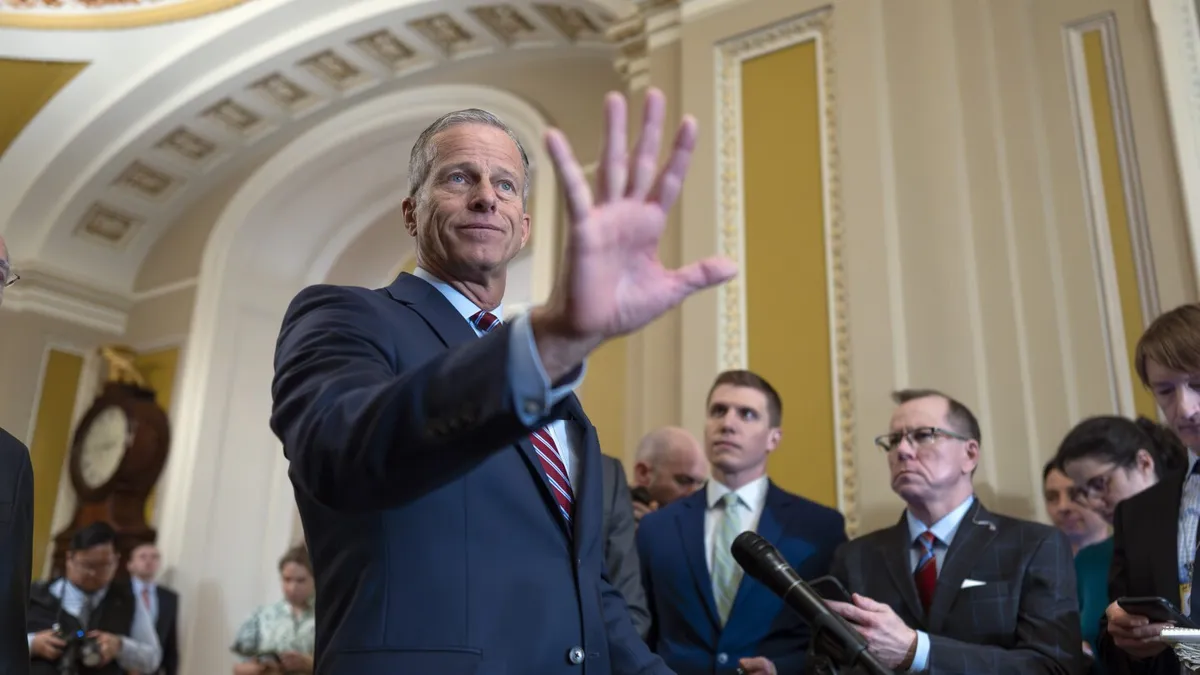
The Senate is in a critical position as it races against the clock to avert a partial government shutdown. With only hours left before funding lapses, Democrats are faced with two challenging choices: either support a bill that they believe grants President Donald Trump excessive authority over federal spending or vote against it, risking a government shutdown.
Senate Democratic leader Chuck Schumer has allowed his caucus to express their frustrations regarding the current options throughout the week. However, as the deadline approaches, Schumer has made it clear that he will not permit a government shutdown. This decision provides Democrats with the opportunity to align with Republicans and bring the continuing resolution (CR) to a vote potentially as soon as Friday.
A procedural vote is scheduled for Friday, which will serve as the first test for the funding package, requiring at least 60 votes to move forward. To achieve this, at least eight Democrats must join the Republicans in support. Schumer articulated the stakes by stating, “While the CR still is very bad, the potential for a shutdown has consequences for America that are much, much worse.”
Congress has struggled to pass the annual appropriations bills necessary to fund the government, resulting in the need for short-term extensions. The legislation currently under consideration marks the third continuing resolution for the ongoing fiscal year, which is now nearly halfway over. If passed, this bill would fund the federal government through the end of September.
Notably, the proposed legislation aims to reduce non-defense spending by approximately $13 billion compared to the previous year, while increasing defense spending by around $6 billion. These adjustments are minimal when considering the overall spending level, which approaches nearly $1.7 trillion.
Earlier in the week, the Republican-led House passed the spending bill and subsequently adjourned, leaving the Senate with a take-it-or-leave-it scenario. GOP leadership has firmly indicated that a fourth short-term extension is not an option. Senate Majority Leader John Thune emphasized that any resulting government shutdown would be blamed on the Democrats, stating, “Democrats need to decide if they’re going to support funding legislation that came over from the House, or if they’re going to shut down the government.”
Progressive groups have been vocal in urging Democratic lawmakers to advocate for a 30-day extension and oppose the current spending bill, arguing that “business as usual must not continue” while Trump and his ally Elon Musk undermine critical agencies and programs. Schumer countered these assertions by highlighting that a shutdown would provide Trump with more power, enabling the administration to classify entire agencies and personnel as non-essential, leading to widespread furloughs without guarantees of reemployment.
Democrats have raised significant concerns about the funding levels outlined in the bill, noting that both defense and non-defense allocations fall short of previous agreements made nearly two years ago. Their apprehension is further fueled by the extensive discretion the bill grants the Trump administration over spending decisions. Many Democrats have characterized the measure as a "blank check" for Trump, as it strips hundreds of funding directives typically included in spending bills.
For instance, a Democratic memo highlighted that the bill allows the administration to divert funds away from combating fentanyl, redirecting them instead towards mass deportation initiatives. Furthermore, funding for over 1,000 projects managed by the Army Corps of Engineers, crucial for commerce, flood control, and healthy ecosystems, would be subject to the administration's discretion rather than congressional oversight.
Democrats have also expressed strong objections to the treatment of the District of Columbia within the bill. The legislation effectively negates the district's current year budget, reverting it to previous levels despite the district’s capacity to generate its own revenue. Mayor Muriel Bowser has indicated that this would necessitate a drastic $1.1 billion cut in spending over a few months.
Additionally, the bill proposes to rescind $20 billion in special IRS funding, compounding a $20 billion cut from the previous year. This action significantly diminishes the funding boost that Congress intended to allocate to the agency through legislation passed during Joe Biden’s presidency.
It's important to note that the spending bill currently before the Senate is distinct from the Republican initiative to extend tax cuts for individuals enacted during Trump’s first term. This second package will be developed in the coming months, but its implications are already influencing Democratic arguments against the proposed six-month extension. Many Democrats have criticized these efforts as a strategy to benefit the wealthy at the expense of average Americans.
Senator Bernie Sanders expressed his concerns, stating, “You’re looking at a one-two punch, a very bad CR, then a reconciliation bill coming down, which will be the final kick in the teeth for the American people.” In response, Senator Tom Cotton argued that the Democratic position is hypocritical, accusing them of seeking to disrupt government operations to protect it. “Democrats are fighting to withhold the paychecks of air traffic controllers, our troops, federal custodial staff,” Cotton remarked. “They can’t be serious.”